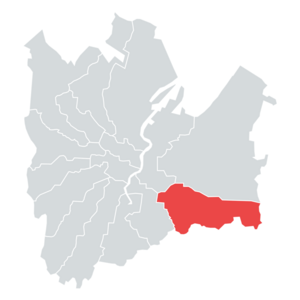Belfast Bloomfield (Northern Ireland Parliament constituency) facts for kids
Quick facts for kids Belfast Bloomfield |
|
|---|---|
| Former Borough Constituency for the Parliament of Northern Ireland |
|

Belfast shown within Northern Ireland
|
|
| Former constituency | |
| Created | 1929 |
| Abolished | 1972 |
| Election method | First past the post |
Belfast Bloomfield was a special area in Northern Ireland that elected a person to the Parliament of Northern Ireland. Think of it like a school district that chooses a student council representative. This area was called a "constituency."
Contents
What Was Belfast Bloomfield?
Belfast Bloomfield was a specific voting area, or constituency, located in the eastern part of Belfast. It was created in 1929. This happened when a new law changed how elections worked across Northern Ireland.
This new law introduced a system called "first-past-the-post." This means that in an election, the candidate who gets the most votes wins, even if they don't get more than half of all the votes.
How the Constituency Was Formed
Before 1929, a larger area called Belfast East existed. This area was then split into four smaller constituencies. Belfast Bloomfield was one of these new areas.
Belfast Bloomfield always elected just one person to the Parliament. It stayed the same until 1972. In 1972, the Parliament of Northern Ireland was temporarily stopped. It was then officially closed down in 1973.
Members of Parliament
A Member of Parliament (MP) is the person elected by the people in a constituency to represent them in the Parliament. Here are the people who represented Belfast Bloomfield:
| Election | Member | Party | ||
|---|---|---|---|---|
| 1929 | Herbert Dixon, 1st Baron Glentoran | Ulster Unionist Party | ||
| 1950(b) | Daniel Dixon, 2nd Baron Glentoran | Ulster Unionist Party | ||
| 1961(b) | Walter Scott | Ulster Unionist Party | ||
| 1973 | Constituency abolished | |||
Election Results Summary
In some early elections, like in 1929 and 1933, the candidate for Belfast Bloomfield, Herbert Dixon, was elected without anyone running against him. This is called being "unopposed."
Throughout its history, Belfast Bloomfield was mainly represented by members of the Ulster Unionist Party. They often won elections by a large number of votes. This shows that the party had strong support in this area.
 | Aurelia Browder |
 | Nannie Helen Burroughs |
 | Michelle Alexander |

